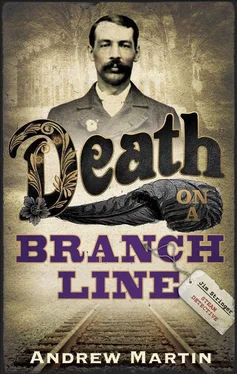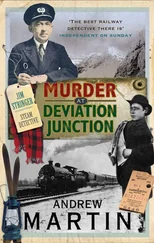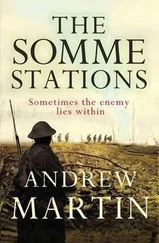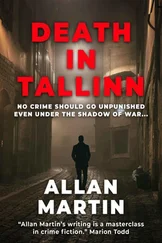Andrew Martin - Death on a Branch line
Здесь есть возможность читать онлайн «Andrew Martin - Death on a Branch line» весь текст электронной книги совершенно бесплатно (целиком полную версию без сокращений). В некоторых случаях можно слушать аудио, скачать через торрент в формате fb2 и присутствует краткое содержание. Жанр: Классический детектив, на английском языке. Описание произведения, (предисловие) а так же отзывы посетителей доступны на портале библиотеки ЛибКат.
- Название:Death on a Branch line
- Автор:
- Жанр:
- Год:неизвестен
- ISBN:нет данных
- Рейтинг книги:5 / 5. Голосов: 1
-
Избранное:Добавить в избранное
- Отзывы:
-
Ваша оценка:
- 100
- 1
- 2
- 3
- 4
- 5
Death on a Branch line: краткое содержание, описание и аннотация
Предлагаем к чтению аннотацию, описание, краткое содержание или предисловие (зависит от того, что написал сам автор книги «Death on a Branch line»). Если вы не нашли необходимую информацию о книге — напишите в комментариях, мы постараемся отыскать её.
Death on a Branch line — читать онлайн бесплатно полную книгу (весь текст) целиком
Ниже представлен текст книги, разбитый по страницам. Система сохранения места последней прочитанной страницы, позволяет с удобством читать онлайн бесплатно книгу «Death on a Branch line», без необходимости каждый раз заново искать на чём Вы остановились. Поставьте закладку, и сможете в любой момент перейти на страницу, на которой закончили чтение.
Интервал:
Закладка:
Rounding the bend that led towards the station, I ran into a confusion of geese, all flapping to take off, and none succeeding any better than any quantity of madly dashing white-skirted women. Nobody seemed to be attending them, and the green was silent and deserted as before.
I crossed the white dazzle of the station yard, and arrived at the ‘up’ platform just a second after the train. It was a Saturday train — short: two carriages and a guard’s van.
Who had it brought?
I walked along the ‘up’, watching the doors, and as I did so, the vicar, who had departed Adenwold the previous evening, climbed down and moved quickly along the platform before cutting across the station yard and disappearing from view. He had left, and now he had come back, carrying the same bag and wearing the same white suit and flower-like hat. He had perhaps been at a dinner. He was another to be taken into account. Or was he? John Lambert had told Hugh that ‘they’ would be coming for him, and the vicar was not a ‘they’. The same objection could be raised in the case of the bicyclist or the man from Norwood. But either might be an agent of some larger group. Or they might all be in league.
I walked further along the platform, still watching the train. The carriage windows were once again sun-dazzled, but I made out an old man sleeping in Third, and he looked as though he might have been inside that dusty red rattler since it was built, or then again he might have lived and died in it, for he made no stir as I looked on.
Coming up to the station house, I noticed for the first time a public telephone attached to the side of it. Pasted above the instrument were the instructions: ‘How to Use the Telephone’, but these were half-obscured by a notice freshly pasted over: ‘Out of Order’. I looked up and saw the west-leading wires reaching away into the woods. They would meet their doom within half a mile, and I could not believe the ones that led in the other direction remained intact either.
I turned again to the train.
All the doors of the carriages remained closed. The engine simmered and waited for its signal; the clock on the ‘up’ moved to 8.55.
In the gloomy doorway of the booking office, I spied the bulk of station master Hardy. What were those soldiers of his in aid of? Some station masters would spell out the name of the station in white stones on a bank of grass, or they’d have a super-fancy flower display — pansies in an ornamental barrow. But the model soldiers were not laid on for the benefit of the passengers — they were entirely for the benefit of Hardy.
The fellow turned towards me from within his hole, and his mouth made the shape of his habitual ‘Oh’, but he kept silence.
There then came the sound of rough Yorkshire voices from the head of the train — from the locomotive itself. As I looked on, a small figure climbed down from the footplate. It was the porter, Woodcock. He was now saying something to the unseen driver or fireman; he carried a cloth bag that no doubt contained the snap and bottle of tea for his turn.
‘Your lad comes in on the engine, does he?’ I asked Hardy.
He turned in the shadows.
‘He likes a ride up,’ he said.
‘He lives along the line, I suppose?’
‘The lad? He lives at East Adenwold. First train of a Saturday brings him in just nicely for the start of his duty. Well, a little late, but near as makes no odds.’
The idle little bugger ought to have biked in like any country station junior, as I had done myself when I’d had my railway start in the village of Goathland up on the Yorkshire Moors. I looked at Hardy, and my gaze seemed to shame him into further speech.
‘The boy has a crib in the signal box,’ he added, ‘and he sometimes kips up there.’
Hardy then looked down at his boots.
I said, ‘Telephone’s bust.’
‘It is, aye,’ he said, looking up.
I eyed the communicator and receiver dials of the ABC machine behind him, saying, ‘Telegraph’s out too, I suppose?’
Hardy nodded. ‘There’s been a general collapse out in the woods,’ he said. ‘It’s not the first time… It’s all out while they fix it.’
‘When did you hear of this?’
‘Last night.’
‘By company runner?’
He nodded again, and I thought of the silver-haired man I’d seen the night before, hurrying through the station yard. He’d been running, but he hadn’t looked like a railway messenger. He’d looked more important than that.
‘How’s the line being worked then?’
‘Oh,’ said Hardy, ‘by ticket.’
In emergencies, a driver would be given a ticket or token authorising him to proceed even against signals set at danger… But I had no clear understanding of the system.
‘I’ve had a look,’ I said, ‘and I’d say the line’s been cut.’
‘Oh,’ said Hardy, ‘well now…’
Woodcock was now eyeing me from a distance of ten feet — it was always a face-down with him. His head was too compressed for my liking — like an old apple. He pursed his thin lips and gave a tremendous fart, staring at me all the while, so that it was very hard to keep in countenance.
‘Been burning some bad powder,’ he said, just as a carriage door opened behind him, and a man stepped down.
He was a dapper dog, this one: blue lounge jacket, white flannel trousers, stiff collar and stripy tie; and the trousers were tucked into highly polished army field boots. I imagined that he’d been arranging his clothes to a look of perfection in his compartment, and that this accounted for his delay in getting down.
The fellow carried a document case and a biggish carpet bag. He was trim, well set-up — uncommonly blue eyes, sunburnt face and sandy hair. He put me in mind of a prosperous sort of colonial farmer, and he had evidently passed a test that I and the wife had failed, for Woodcock put down his own bag and hurried up to the man. Here was a chance to put the bleed on — carry the two bags at a shilling apiece to some waiting vehicle, for this was certainly the sort of fellow who’d be met, except that I could see clear through to the station yard, and it was empty as before.
The man sent Woodcock packing with a word. He then struck out along the platform and out towards the triangular green where he stood getting his bearings. I watched him from the platform as Woodcock moved alongside me again.
‘Bad luck,’ I said.
No reply from the porter.
‘Do you know him?’ I asked.
‘I know his type,’ said Woodcock.
‘That chap falls into the class of a mean toff,’ I said. ‘Looks a good bet for a tip, but en’t. I was a lad porter myself once, and I always reckoned to be able to spot that sort the minute they climbed down.’
‘Cut the blarney,’ said Woodcock.
I said, ‘You have a ride in on the engine come Saturday, I see,’ and I nodded towards the locomotive.
Woodcock muttered something I couldn’t catch, before asking in a louder voice, ‘You okay today, pal?’
He was moving, as he spoke, towards the end of the train, and the guard’s van. I looked on as he took down from the unseen guard a quantity of newspapers, a wooden box and a hamper tied about with a leather strap. The newspapers were loosely covered in brown paper, but I could make out one of the headings: ‘The Moroccan Sensation: Reports of a Further Grave Incident’.
‘Reckon you were half seas over last night,’ Woodcock said, standing over the packages, ‘spoiling for a scrap, you were.’
The train was at last pulling away.
The wooden box, I now saw, was a crate of wine.
‘Who’s this lot for?’ I asked, indicating the goods, and shouting over the roar of the departing engine.
‘Nosey bloke, en’t you?’
I fished in my pocket for a tanner and passed it to him.
Читать дальшеИнтервал:
Закладка:
Похожие книги на «Death on a Branch line»
Представляем Вашему вниманию похожие книги на «Death on a Branch line» списком для выбора. Мы отобрали схожую по названию и смыслу литературу в надежде предоставить читателям больше вариантов отыскать новые, интересные, ещё непрочитанные произведения.
Обсуждение, отзывы о книге «Death on a Branch line» и просто собственные мнения читателей. Оставьте ваши комментарии, напишите, что Вы думаете о произведении, его смысле или главных героях. Укажите что конкретно понравилось, а что нет, и почему Вы так считаете.











